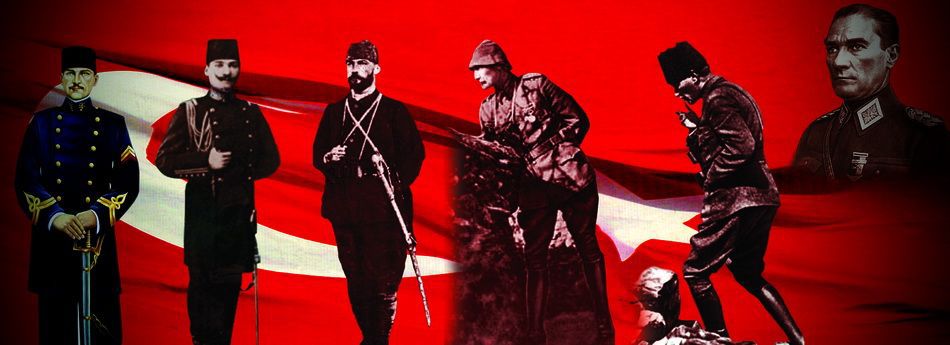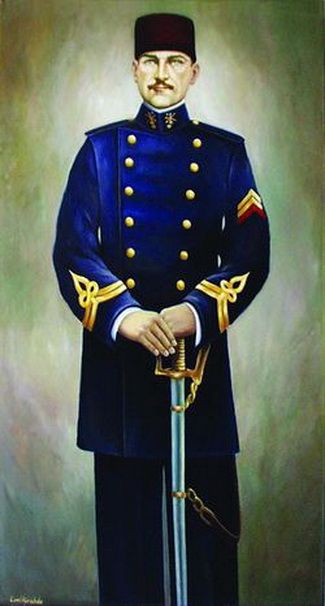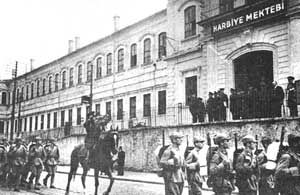
Biography of Mustafa Kemal Atatürk

Mustafa Kemal Atatürk was born in the Kocakasım District of Salonica in 1881 in a three-story pink house on Islahane Street. His father's name was Ali Rıza Efendi and his mother was Zübeyde Hanım. His paternal grandfather, Hafız Ahmet Efendi, was from the Kocacık Yörüks (a Turkish nomadic tribe), who had emigrated from Konya and Aydın and settled in Macedonia during the 14th and 15th centuries. His mother, Zübeyde Hanım, was the daughter of an old Turkish family that had settled in the town of Langaza near Salonica. Ali Rıza Efendi, who served as a militia officer, an estate clerk and a lumber merchant, married Zübeyde Hanım in 1871. Four of Atatürk's five siblings died at an early age and only his sister Makbule (Atadan) lived until 1956.
When Mustafa reached school age, he started his education at the Hafız Efendi local primary school; however, upon his father's request, he later switched to Şemsi Efendi School. After loosing his father in 1888, he spent some time on the Rapla farm with his maternal uncle and later returned to Salonica and finished his school. He enrolled in the Salonica Secondary School. In 1893, he entered the Military Middle School. In the military school, his mathematics teacher gave him his middle name "Kemal", which means "mature and perfect". After attending the Manastır (Bitola) Military High School between 1896 and 1899, he started his education at the Military Academy in Istanbul . Upon graduating with the rank of lieutenant in 1902, he attended the Army War College. On January 11, 1905, he graduated from the Army War College as Captain. Between 1905 and 1907, he served in the 5th Army in Damascus. After being promoted to Senior Captain in 1907, he was assigned to the 3rd Army in Bitola (Manastır). On April 19, 1909, he was the Chief of Staff in the Action Army, which entered Istanbul to quell the March 31st Incident. In 1910, he was sent to France and took part in the Picardie Maneuvers. In 1911, he started to work at Ottoman General Staff in Istanbul.

In 1911,during the war that started upon the Italians' assault on Tripoli, Mustafa Kemal took up duties with a group of comrades in the Tobruk and Darnah regions. After defeating the Italians in the Tobruk Battle on December 22, 1911, he was appointed as the Commander of Darnah on March 6, 1912.
When the Balkan War started in October 1912, Mustafa Kemal participated in the war with regiments from Gallipolis and Bolayır. He performed great service in the recapturing of Dimetoka and Edirne. In 1913, he was assigned as the Military Attaché to Sofia. As the incumbent attaché, he was promoted to the rank of Lieutenant Colonel in 1914. His assignment as Military Attaché ended in January 1915. In the meantime, World War I had started and the Ottoman Empire was forced to participate in the war. Mustafa Kemal was appointed to Tekirdağ to establish the 19th Division.
During World War I, Mustafa Kemal made history and thanks to his great service, the Entente States had to confess, "Dardanelle straits is impassable!" When the British and French fleets suffered heavy losses during the attempts to pass the Dardanelle Straits on March 18, 1915, they decided to land troops on the Gallipolis Peninsula. When the enemy forces landed at Arıburnu (Cape of Bees) on April 25, 1915, the 19th Division, under the command of Mustafa Kemal, stopped them at Conkbayırı (Chunuk Bair). As a result of this success, Mustafa Kemal was promoted to the rank of Colonel. The British forces attacked Arıburnu again on August 6-7, 1915. The Commander of Anafartalar Group Mustafa Kemal won the Anafartalar Victory on August, 9-10. This victory was followed by the victories at Kireçtepe on August 17, and the 2nd Anafartalar victory on August 21. The Turkish Nation, which had 253,000 casualties during the Gallipolis Battles, knew how to protect their honor against the Entente States. Mustafa Kemal's command to his soldiers, "I am not ordering you to attack, I am ordering you to die!" changed the fate of the battle.
In 1916, after the Gallipolis Battles, Mustafa Kemal took up duties in Edirne and Diyarbakır. On April 1, 1916, he was promoted to the rank of Major General. By fighting against the Russian forces, he recaptured the provinces of Muş and Bitlis. After short-term duties in Damascus and Aleppo, he came to Istanbul in 1917. He went to Germany with Crown Prince Vahdettin Efendi and examined the front. He became ill after this trip. He went to Vienna and Karlsbad for treatment. On August 15, 1918, he returned to Aleppo as the Commander of the 7th Army. At this front, he undertook successful defensive battles against the British Forces. On October 31, 1918, one day after the signing of the Moudros Armistice, he was appointed as the Commander of the Lightning Armies Group. Upon the abolishment of this army, on November 13, 1918, he came to Istanbul and commenced duties at the Ministry of War.
Following the Moudros Armistice, when the Entente States began invading the lands of Ottoman Empire, Mustafa Kemal went to Samsun on May 19, 1919, as the 9th Army Inspector. In the Amasya Proclamation, published on June 22, 1919, he announced, "The independence of the country will be secured by the determination and decisiveness of the nation" and he summoned the Sivas Congress to a meeting. The Erzurum Congress convened between July 23 - August 7, 1919 and the Sivas Congress September 4 - 11, 1919, to identify the direction of the independence movement. He was welcomed with excitement in Ankara on December 27, 1919. With the opening of the Turkish Grand National Assembly on April 23, 1920, a significant step was taken on the path to founding the Turkish Republic. Mustafa Kemal was elected as the Chairman of the Assembly and the Head of the Government. The Turkish Grand National Assembly promulgated the necessary laws for the successful conclusion of the War of Independence and ensured the proper implementation of these laws.
The Turkish War of Independence started on May 15,1919 with the shooting of the first bullet, during the Greek invasion of İzmir. Initially, militia forces called "Kuvay-i Milliye" (National Forces) fought against the victors of World War I who planned to divide the Ottoman territory among them under the cover of the Sevres Treaty signed on August 10, 1920. The Turkish Grand National Assembly established a regular army and united the National Forces under this army, which concluded the Turkish War of Independence in victory.
Under the leadership of Mustafa Kemal, the important stages of the Turkish War of Independence are as follows:
- The Liberation of Sarıkamış (September 20, 1920), Kars (October 30, 1920) and Gümrü (November 7, 1920)
- Defending the provinces of Çukurova, Gaziantep, Kahramanmaraş and Şanlıurfa (1919-1921),
- The First İnönü Victory (January 6-10, 1921)
- The Second İnönü Victory (March 23 - April 1, 1921)
- Sakarya Pitched Battle (August 23 - September 13, 1921)
- The Great Attack, the Commander-in-Chief Battle and the Great Victory (August 26-September 9, 1922)
After the Sakarya Victory, on September 19, 1921, the Turkish Grand National Assembly bestowed Mustafa Kemal with the rank of Marshal and the title of Gazi (war veteran). The War of Independence ended on July 24, 1923 upon the signing of the Lausanne Treaty. Thus, there were no obstacles to prevent the foundation of a new Turkish State on the Turkish land that had previously been divided up by the Sevres Treaty foreseeing a homeland of only 5-6 provinces left to the Turks.
On April 23, 1920, the opening of the Turkish Grand National Assembly in Ankara heralded the foundation of the Turkish Republic. The Assembly's successful managing of the Turkish War of Independence accelerated the foundation of the new Turkish State. On November 1, 1922, the Caliphate and the Sultanate were separated from each other and the sovereignty of the sultans was abolished. Thus, the administrative ties with the Ottoman Empire were broken off. On October 29, 1923, the Republican regime was accepted and Atatürk was elected unanimously as the first President of the new Republic. On October 30, 1923, the Republic's first government was established by İsmet İnönü. The Turkish Republic started to develop on the principles of "Sovereignty unconditionally and unrestrictedly belongs to the nation" and "Peace at home, peace in the world".
In accordance with the Surname Law, Mustafa Kemal was bestowed the surname "Atatürk" (Father of Turks) by the Turkish Grand National Assembly on November 24, 1934.

The Great Leader, Atatürk was elected as the Chairman of the Turkish Grand National Assembly on April 24, 1920 and again on August 13, 1923. This presidential duty was at the level of State and Government Presidency. On October 29, 1923, the Republic was proclaimed and Atatürk was elected the first President. In accordance with the Constitution, presidential elections were repeated once every four years. In 1927, 1931 and 1935, the Turkish Grand National Assembly re-elected Atatürk as president.
Atatürk frequently went on trips throughout the country to check on the state activities on sight. He gave orders to relevant officials concerning delayed activities. As President, he hosted the heads of state, prime ministers and commanders of foreign countries who paid visits to Turkey. Between October 15 and 20, 1927, he gave his Great Speech, which narrates the War of Independence and the foundation of the Republic, and on October 29, 1933, he delivered his Tenth Year Speech.
Atatürk's personal life was a simple one. On January 29, 1923, he married Latife Hanım in İzmir. Together they went on many trips throughout the country. This marriage lasted until August 5, 1925. Atatürk loved children very much and he adopted Afet (İnan), Sabiha (Gökçen), Fikriye, Ülkü, Nebile, Rukiye, Zehra, and Abdurrahim Tunçak, and he also took two boys named Mustafa and İhsan under his protection and prepared a bright future for them.
In 1937, he donated his farms to the treasury and some of his property to the Ankara and Bursa Municipalities. From his estate, he spared shares for his sister, his adopted children and the Turkish Language and History Associations. He enjoyed reading, listening to music, dancing, horseback riding and swimming very much. He had an extreme interest in the Zeybek (Western Anatolian) folk dances, the Rumeli (Balkan Peninsula) folk songs and wrestling. He enjoyed playing backgammon and billiards. He put great value on his horse named Sakarya and his dog Fox. He built up a rich library. He invited statesmen, scientists and artists to dinners and debated the current issues of the country with them. He paid great attention to his appearance. He loved nature very much. He frequently went to the Atatürk Forest Farm and personally participated in the activities.
He spoke French and German. He passed away at Dolmabahçe Palace in Istanbul on November 10, 1938 at 9:05 a.m. due to liver cirrhosis. His deceased body was brought with a ceremony to its temporary place of rest at the Ankara Ethnography Museum on November 21, 1938. Upon the completion of Anıtkabir (the mausoleum), his body was buried in its eternal place of rest with a magnificent ceremony on November 10, 1953.